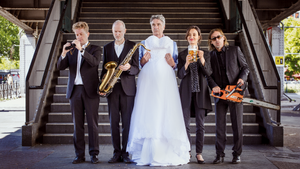In the organizer's words:
The young parents Pinneberg and Lämmchen hold on to their love and belief in bourgeois morality - despite poverty, unemployment and social hardship. Their struggle for a last vestige of dignity ends on the edge of the Moloch that is Berlin. Hans Fallada summarizes his internationally successful novel, which he could only publish censored in 1932 in times of extreme economic and political tension in Germany, as follows: "Marriage and woe of Johannes Pinneberg, clerk, loses his job, gets a job, becomes unemployed for good. One of six million, a nothing, and what the nothing feels, thinks and experiences." The question "What now?" was historically answered by the National Socialists' seizure of power. Fallada answered the question of how effective individual cohesion can be in a mass society with a utopian moment.
Frank Castorf adapts the original version of the novel and relates it to autofictional texts by Fallada, most of which he wrote in prison and in psychiatric wards, such as "Die Kuh, der Schuh, dann du".
The performance lasts five hours, including an interval.
This content has been machine translated.








